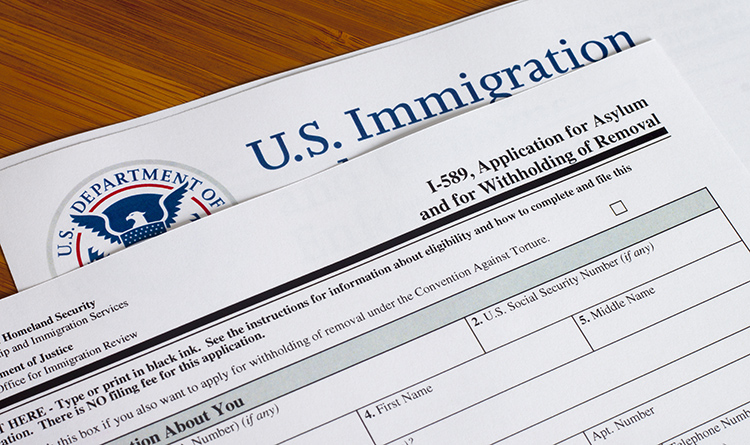New rule would make applying for US asylum impossible for most immigrants at the southern border

Image from Shutterstock.
Updated: Most immigrants at the southern border won’t be eligible to apply for asylum under an interim final rule published Monday by the Trump administration.
Under the new rule, immigrants at the southern border must apply for asylum in at least one country they enter while on their way to the United States, report CNN, the Associated Press, the Los Angeles Times, the Washington Post, the New York Times and the Wall Street Journal.
The rule effectively ends asylum for any migrant at the southern border who isn’t from Mexico, according to the Los Angeles Times. The proposal would require migrants to apply for asylum even though the United States hasn’t negotiated a “safe third-country” agreement with the countries they traverse. Currently, the United States has such an agreement with Canada; it requires asylum-seekers entering the United States from Canada to first apply for asylum in Canada.
The rule is scheduled to take effect on Tuesday. Exceptions apply for victims of human trafficking, for people denied asylum by other nations, and for people who arrive at the United States after traveling through a nation that isn’t a party to international treaties governing refugees.
ABA President Bob Carlson said in a statement on Wednesday that the ABA “strongly opposes changes to United States asylum law that effectively eliminate asylum for most men, women and children fleeing persecution and violence in their home countries.”
Carlson said the rule changes “gut current asylum law” and “override the clear intent of Congress.” He also said the changes “abrogate our nation’s responsibility to protect asylum-seekers under international law.”
“The ABA calls on the administration to reverse its course and abandon these changes and to instead enforce laws that guarantee fair treatment and due process for asylum-seekers,” Carlson said.
The American Civil Liberties Union “will sue swiftly” over the new rule, according to a statement by Lee Gelernt, deputy director of the Immigrants’ Rights Project of the American Civil Liberties Union.
“The Trump administration is trying to unilaterally reverse our country’s legal and moral commitment to protect those fleeing danger,” he said. “This new rule is patently unlawful.”
The U.S. Department of Justice and the Department of Homeland Security published the rule in the Federal Register. It cited increasing numbers of immigrants at the southern border and an increasing percentage of immigrants seeking asylum.
A large number of asylum claims are meritless, the rule says.
Attorney General William Barr explained the Justice Department’s support for the rule in a statement. “The United States is a generous country but is being completely overwhelmed by the burdens associated with apprehending and processing hundreds of thousands of aliens along the southern border,” he said. “This rule will decrease forum shopping by economic migrants and those who seek to exploit our asylum system to obtain entry to the United States.”
The rule states that it aims to curtail the humanitarian crisis at the border and to aid the United States in negotiations with foreign nations on migration issues.
The U.S. government has been in talks with Guatemala to require its government to provide asylum protections to people from Honduras and El Salvador through a safe third-country agreement. But Guatemala’s constitutional court issued an injunction on Sunday that blocks the country’s president from signing such a proposal, the Wall Street Journal reports.
The Trump administration previously required asylum-seekers to show a credible fear of persecution upon return to their countries to await asylum proceedings in Mexico. In May, the San Francisco-based 9th U.S. Circuit Court of Appeals allowed that policy to remain in effect pending appeal.
The 9th Circuit blocked a different restriction in December that said asylum claims could be made only by people who entered the United States through ports of entry. The U.S. Supreme Court refused to lift the injunction the same month.
Updated on July 17 to include Carlson’s statement.
Write a letter to the editor, share a story tip or update, or report an error.


